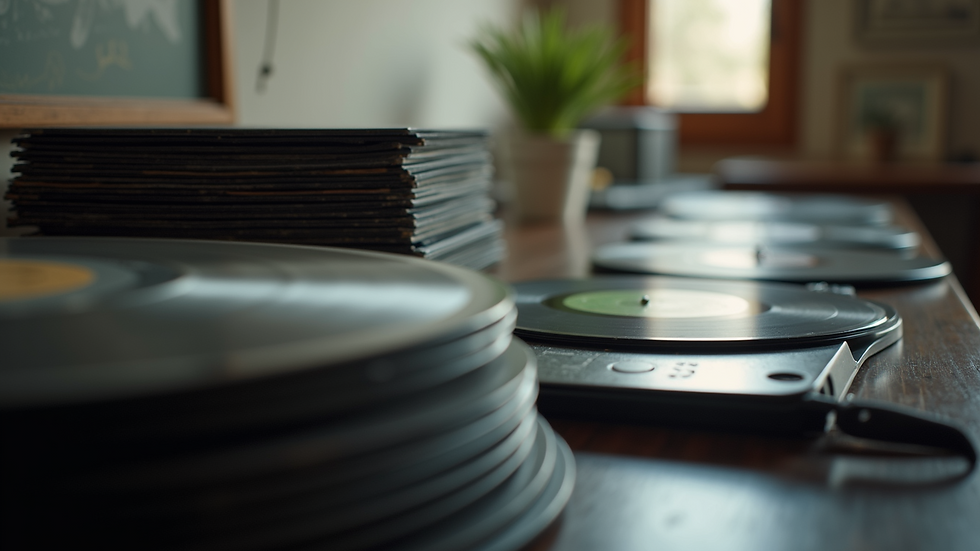A Beginner’s Guide to Starting Your Own Podcast
- Gorilla Mode Entertainment
- May 14, 2025
- 4 min read
Podcasting is one of the fastest-growing forms of media today. In recent years, the podcasting landscape has expanded dramatically, giving rise to various genres and communities. If you've ever thought about starting your own podcast, this guide will give you everything you need to know, including practical tips, equipment recommendations, and even inspiration from hip hop podcasts.
Understanding the Basics of Podcasting
Before you dive into the nitty-gritty, it's essential to understand what a podcast is. A podcast is essentially an audio program that can be downloaded or streamed online. They can be produced by anyone, from individuals to large corporations, and can cover virtually any topic imaginable.
The beauty of podcasting lies in its flexibility. You can create episodic content, interview guests, or even discuss topics like current events or hobbies. The possibilities are endless!

Choosing Your Niche: Exploring Hip Hop Podcasts
One of the critical decisions you’ll make is choosing your podcast's niche. You want to select a topic that excites you and resonates with an audience. If you're passionate about music, particularly hip hop, you could explore the dynamic world of hip hop podcasts.
These podcasts often feature discussions about new releases, artist interviews, and cultural commentary. They can also serve as a platform for aspiring artists to share their music and experiences. By focusing on a specific niche such as hip hop, you can build a community of like-minded listeners.
Who is the group that is interviewed that put out hip-hop's first rap record?
To provide some historical context for your listeners, you may want to explore the pioneers of hip hop. While there are many influential groups, The Sugarhill Gang is often credited with releasing hip hop's first recorded rap, "Rapper's Delight," in 1979. Their work laid the groundwork for the genre and opened doors for countless artists to come.
In your podcast, you might take the opportunity to discuss the implications of their success. You could even interview experts or longtime fans to provide deeper insights. By creating episodes around these topics, you not only engage your audience but also contribute to a more significant cultural dialogue.

Planning Your Episodes: Structure and Content
Once you've chosen your niche, it's time to plan your episodes. Structure is vital for keeping your audience engaged. Consider breaking down your podcast into segments. For example:
Introduction: Briefly introduce the episode's theme or guest.
Main Content: Dive into the main topic, whether it's an interview, discussion, or a storytelling format.
Q&A Session: Engage with listeners' questions if you're taking them.
Closing: Summarize the episode and tease upcoming content.
Consistency is key, so aim for a regular upload schedule. Whether it's weekly, biweekly, or monthly, your audience should know when to expect new content.
Necessary Equipment and Software
When starting a podcast, you don’t need expensive equipment, but good sound quality is crucial. Here's a basic list of equipment you will need:
Microphone: Investing in a quality microphone is vital. Consider a USB microphone for ease of use, or an XLR microphone for more advanced sound quality.
Headphones: Good headphones will help you hear audio quality during recording and editing sessions.
Recording Software: Programs like Audacity or GarageBand are free and user-friendly for beginners.
Hosting Platform: You'll need a podcast hosting platform to distribute your episodes. Options like Podbean or Libsyn can be great for beginners.
For a more specialized focus, listening to successful hip hop podcasts can provide inspiration. Try identifying their recording techniques, episode structures, and even the type of content they create.

Promoting Your Podcast
Creating your podcast is just the first step; you also need to promote it. Here are some effective promotion strategies:
Social Media: Use platforms like Instagram, Twitter, and Facebook to share your episodes. Share behind-the-scenes content to pique interest.
Guest Appearances: Feature guests on your show or be a guest on others. This cross-promotion can increase your audience.
Networking: Engage with other podcasters and participate in podcasting communities. Collaborating can open new avenues for exposure.
Don’t forget to create a visually appealing cover art for your podcast. This is the first thing potential listeners will see, so make sure it represents your podcast effectively.
Engaging with Your Audience
Building a community not only helps you grow your podcast but also creates loyal listeners. Encourage feedback through social media, emails, or voicemail. You may even want to dedicate an episode to address audience questions or comments.
Creating a space for audience interaction can deepen the connection between you and your listeners. Think about organizing live Q&A sessions or special events where listeners can engage more directly with you or your guests.
Final Thoughts on Starting Your Podcast Journey
Starting a podcast can seem overwhelming at first, but remember that every expert was once a beginner. Keep your passion alive, explore various hip hop podcasts for inspiration, and don't hesitate to make adjustments along the way. It's about finding your unique voice and connecting with your audience in a genuine way.
Embrace the challenge and enjoy the process of creating content that resonates with listeners. Whether you aim to interview artists, share insights, or foster conversations, your podcast can be a platform for creativity and expression. Start today, and soon you'll find yourself part of an incredible global community of podcasters!
Happy podcasting!




Comments